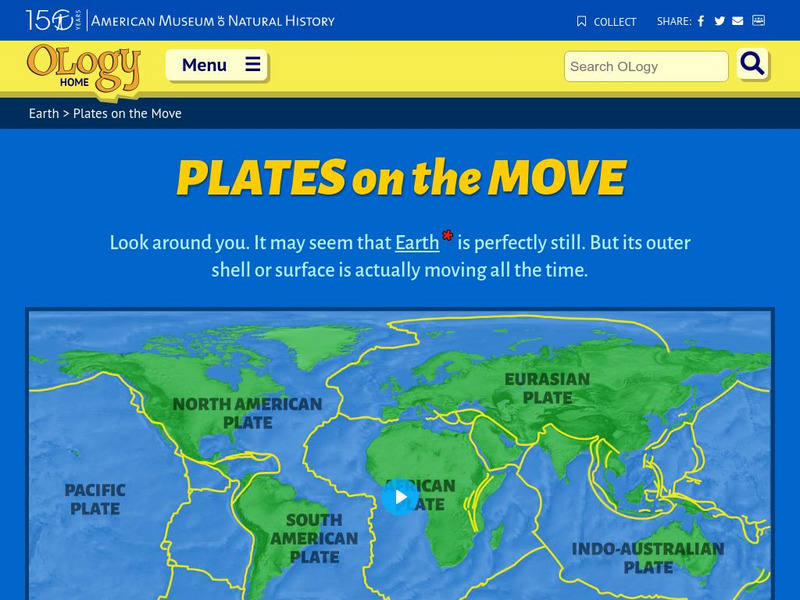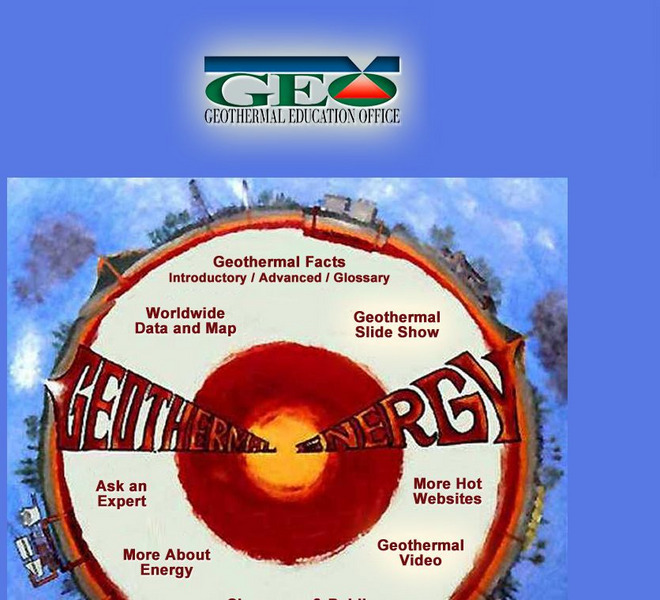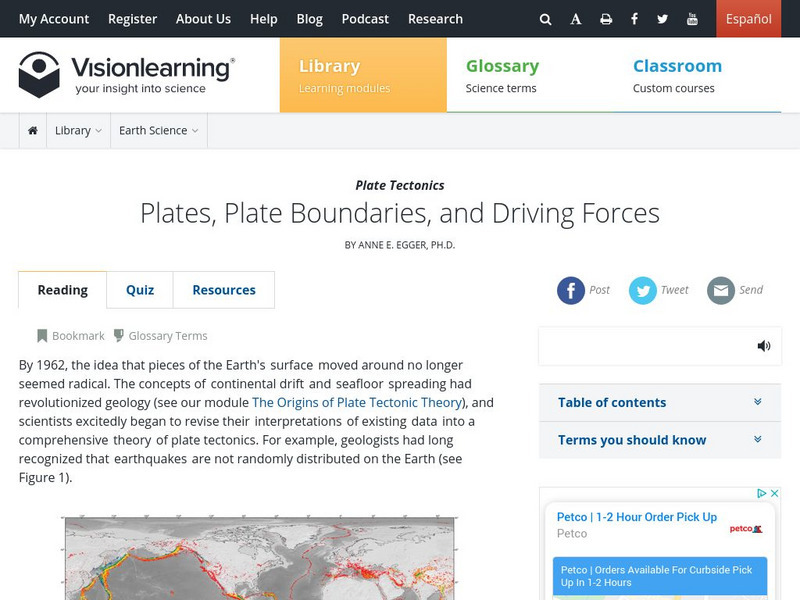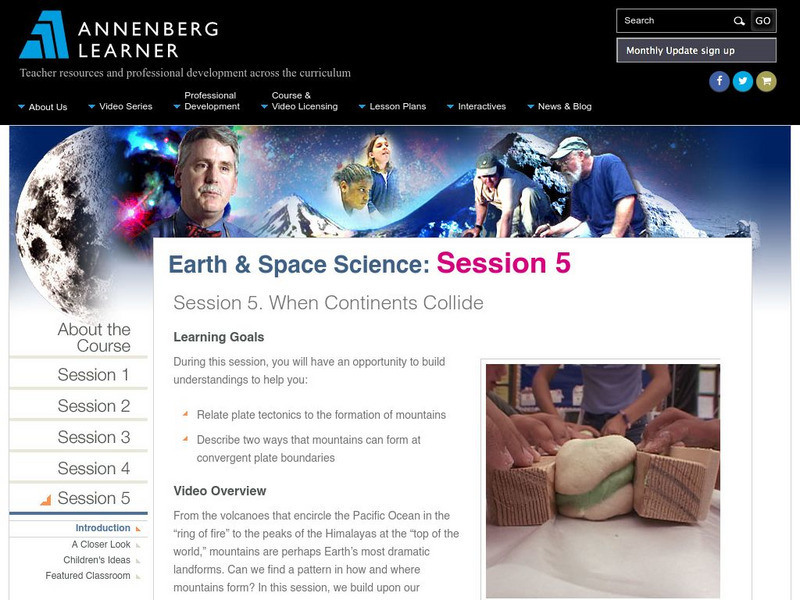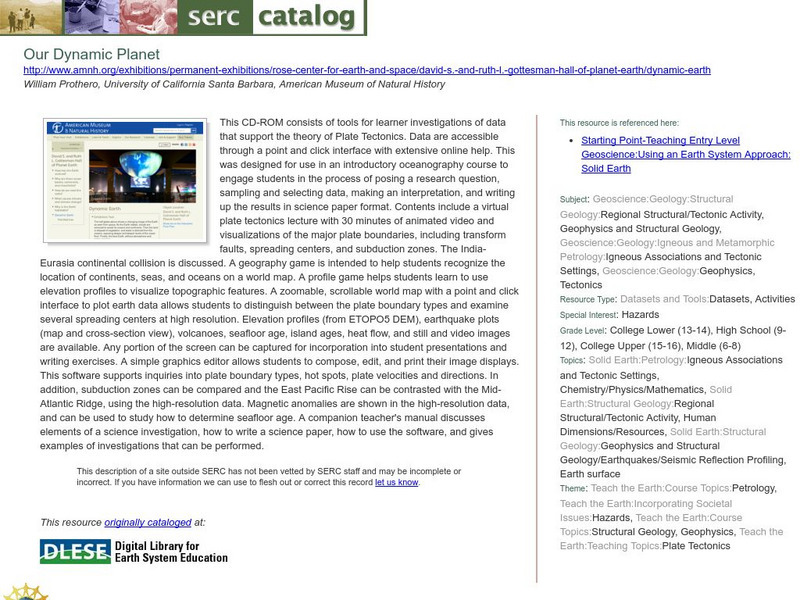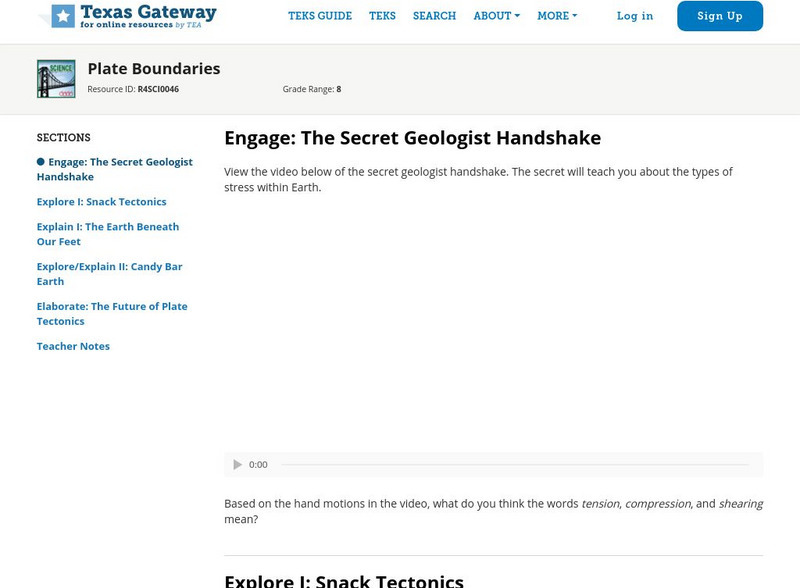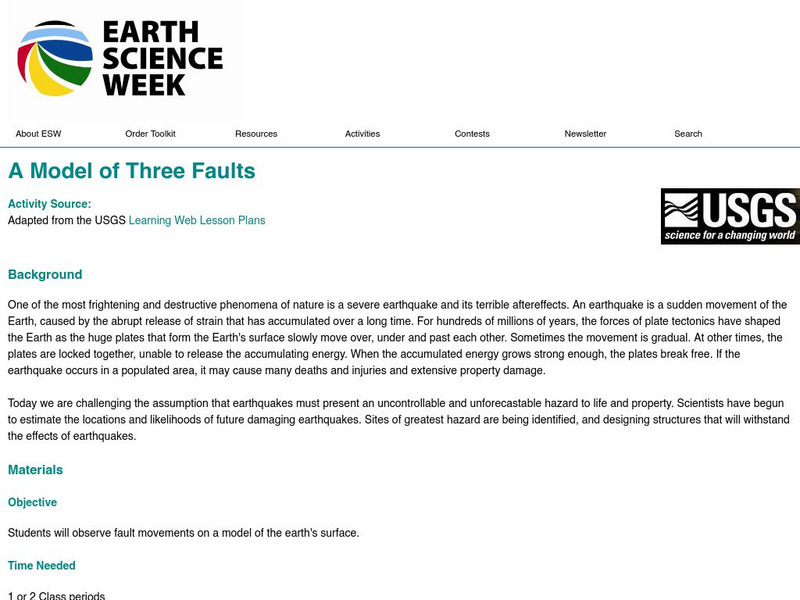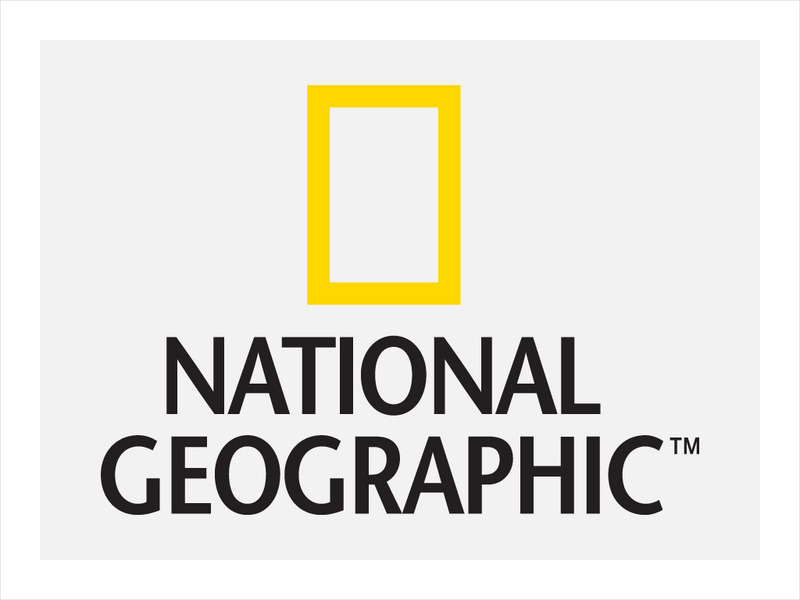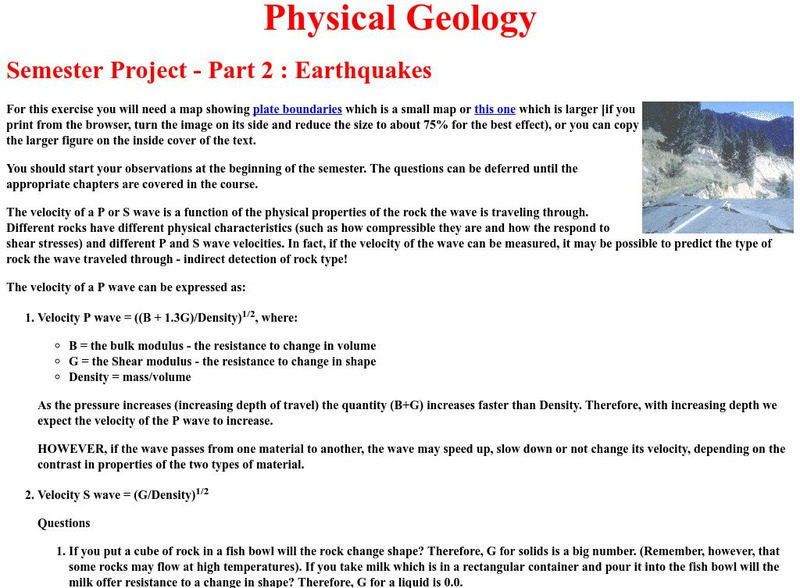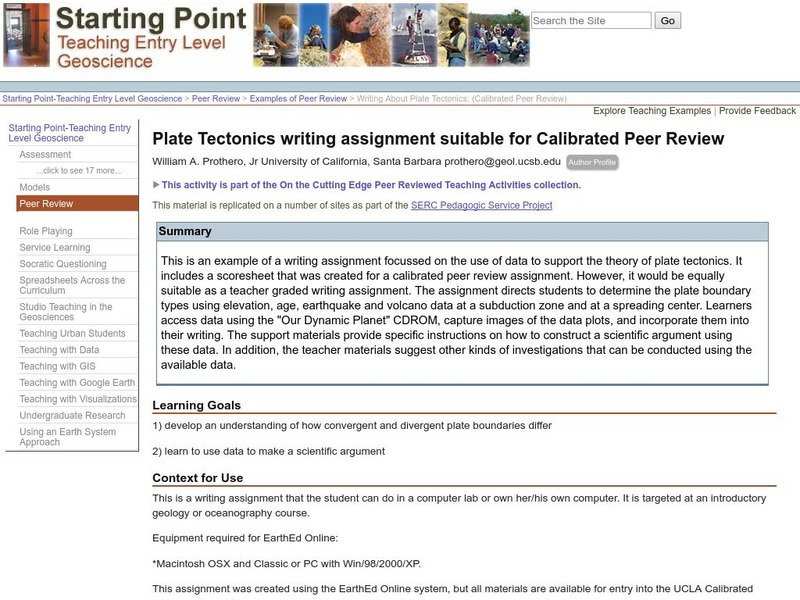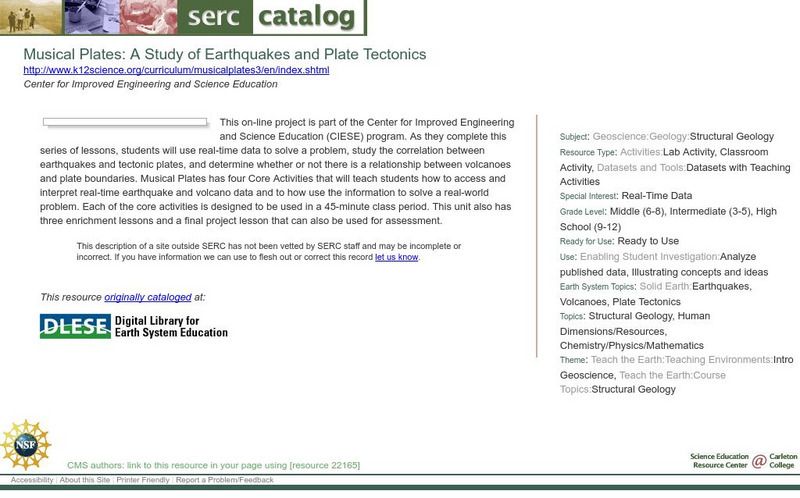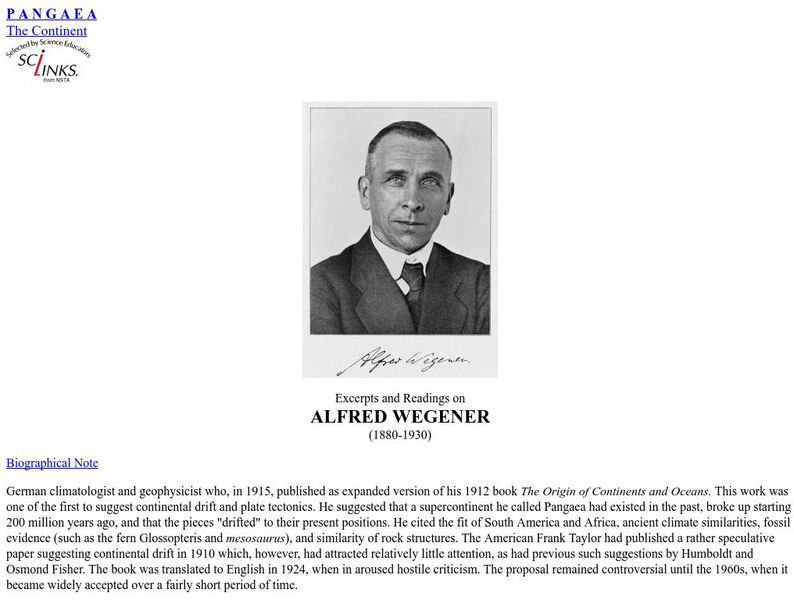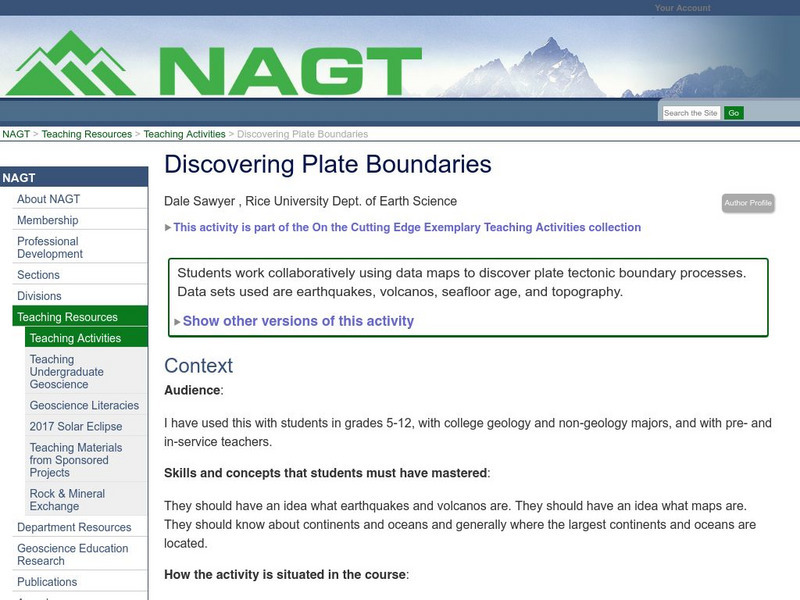American Museum of Natural History
American Museum of Natural History: O Logy: Plates on the Move
Find an interrelated set of tools--maps, animations, diagrams, photographs, and text--to help you understand tectonic plates and how they move.
American Museum of Natural History
American Museum of Natural History: Plates on the Move
Explore how plates move with this interactive site. Students choose locations on the map of Earth to see if the tectonics plate are slipping, spreading, colliding, or subducting.
Other
Geothermal Education Office
This resource for geothermal energy education features a slide show with instructive graphics.
Annenberg Foundation
Annenberg Learner: Interactives: Dynamic Earth: Slip, Slide, & Collide
Looking for more information about plate tectonics and what happens at plate boundaries? This site gives definitions of all plate boundaries as well as animations to help visualize what is happening.
Vision Learning
Visionlearning: Earth Science: Plate Tectonics Ii: Plate Boundaries and Forces
Instructional module focusing on plate tectonics. Discussion includes plates, plate boundaries, and driving forces. Site also includes an interactive practice quiz and links relating to the topic.
Annenberg Foundation
Annenberg Learner: Earth and Space Science: When Continents Collide
Material to begin an exploration of plate tectonics and mountain formation. An hour-long video is accompanied by learning goals, an outline and overview, details on metamorphic rocks and mountain building, and ideas for teaching this...
Annenberg Foundation
Annenberg Learner: Dynamic Earth Interactives
Interactive tutorials on plate tectonics, plates and boundaries, and the Earth's structure convey the dynamism of geologic processes, such as earthquakes and volcanoes. Takes a multidimensional approach to coverage of basic geologic...
Exploratorium
Exploratorium: Earthquake Faultline Earthquake Activities
This outstanding website provides an excellent variety of hands-on earthquake activities to help you understand what causes earthquakes.
US Geological Survey
Usgs: Understanding Plate Motions
The U.S. Geological Survey provides descriptions and illustrations for the plate boundaries of the Earth's surface.
Science Education Resource Center at Carleton College
Serc: Our Dynamic Planet
Learn about the theory of Plate Tectonics with this site that links to a site to order a CD-ROM that contains tools for learners to investigate the theory. On the CD-ROM is included virtual plate tectonics lecture, animations,...
Texas Education Agency
Texas Gateway: Plate Boundaries
Find out about what happens at plate boundaries.
American Geosciences Institute
American Geosciences Institute: Earth Science Week: A Model of Three Faults
In this lesson, students learn about the different kinds of faults and plate boundaries and where they can be found. They research and report on the faults that are present in their state. They are also asked to develop models of three...
National Geographic
National Geographic: Plate Tectonics
A short tutorial on plate tectonics. Includes a video, background reading, three questions, fast facts, and a vocabulary list. Discusses the publication of the Tharp-Heezen map of the seafloor in 1977 which paved the way for a much...
PBS
Pbs Learning Media: Tectonic Plates and Plate Boundaries
This interactive activity adapted from NASA features world maps that identify different sections of the Earth's crust called tectonic plates. The locations of different types of plate boundaries are also identified, including convergent,...
University of Houston
University of Houston: Earthquakes
This exercise will help students understand the plate boundaries of earthquakes.
University of California
Tectonic Plates
Get an overview of all the tectonic plates that make up the earth's crust. The colorful contrasting and labeled plate boundaries make this an excellent resource.
Science Education Resource Center at Carleton College
Serc: Writing About Plate Tectonics
This instructional activity is a writing assignment focussed on the use of data to support the theory of plate tectonics. It includes a scoresheet that was created for a calibrated peer review assignment. The assignment directs students...
Science Education Resource Center at Carleton College
Serc: A Data Rich Exercise for Discovering Plate Boundary Processes
This article in the Journal of Geoscience Education describes a classroom exercise based on four world maps containing earthquake, volcano, topographical and seafloor age data. Students participate in this exercise by using a "jigsaw"...
Science Education Resource Center at Carleton College
Serc: Musical Plates: A Study of Earthquakes and Plate Tectonics
Four part lab activity involves students using real-time data to solve a problem, study the correlation between earthquakes and tectonic plates, and determine whether or not there is a relationship between volcanoes and plate boundaries.
Science Education Resource Center at Carleton College
Serc: Discovering Plate Boundaries
A data rich exercise built around four global data maps to help students discover the processes that occur at plate tectonic boundaries. The lesson is based on the jigsaw concept, mixing the students to work in different groups during...
PBS
Mountain Maker Earth Shaker
This resource gives an introduction to the theory of plate tectonics. It also has animations of four types of plate boundary interactions (convergent, divergent, transforming, collisional).
Other
Pangea: Alfred L. Wegener Biography
Two biographies of Wegener and his work including his theory on how raindrops form.
E-learning for Kids
E Learning for Kids: Madagascar: What Are Tectonic Plates and How Are They Moving?
This lesson teaches students about tectonic plates, plate boundaries, and their role in earthquakes and volcanoes.
National Association of Geoscience Teachers
Nagt: Discovering Plate Boundaries
Students work collaboratively using data maps to discover plate tectonic boundary processes. Data sets used are earthquakes, volcanoes, seafloor age, and topography.


